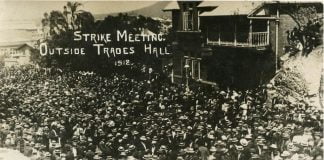Rogue Economics
Loretta Napoleoni, Allen & Unwin, $29.95
WHAT LINKS the growth in sex trade in Eastern Europe, fishing piracy in the North Sea and professional players of the online computer game World of Warcraft?
According to Loretta Napoleoni they are all examples of the rise to dominance of a terrifying form of economic activity which she calls rogue economics.
In this ambitious work she attempts to show, through a wide ranging account of contemporary organised crime, that the period since the fall of the Berlin Wall is defined by the dominance of economics over politics.
According to Napoleoni, “Rogue economics is not exceptional but endemic, a dark force encrypted in our social DNA, constantly lurking in the background of the societies in which we live.”
Napoleoni sees a constant fight in history between politics and the tendency of rogue economics. At various times political institutions have reined in rogue economics, and given people some control over it.
However, the fall of the “communist regimes”, she argues, unleashed rogue economics on an unprecedented scale.
The fall of these regimes is combined with the spread of globalisation and the weakening of the nation state, which erodes politics even further in its fight against rogue economics.
Despite Napoleoni’s dramatic and innovative language, these are not new ideas.
The argument that globalisation has weakened the nation-state and its control over the economy has been repeated consistently in recent years, but this has not made it true.
Her separation of politics and economics also misrepresents dramatically the nature of the economy.
Neo-liberalism
The spread of neoliberalism did not involve a retreat of politics and the nation-state. Rather the policies that drove back gains in wages and working conditions and spread privatisation both within the West and in the developing world were driven through politically.
They required conscious political interventions by states and governments on behalf of major corporations.
By concentrating explicitly on the criminal aspects of global economics, Napoleoni detracts from this bigger picture.
For Napoleoni the nation-state is clearly the most important safeguard against the damaging rise of rogue economics. This makes her political analysis very shallow.
The actions of nation-states are consistently seen as innocent attempts to challenge rogue economics that lead to unfortunate consequences.
Her fondness for state control seems to generate nostalgia for the Soviet Union and its satellites, which doesn’t help her case.
The book builds towards a preposterous conclusion, in which she predicts that Islamic finance will gradually come to dominate the economy, and drive out rogue economics, and the Third World will come to dominate the globe.
This will carve out a new world order which “will be ruled by an invisible axis stretching from Beijing to Cape Town. Europe and America will lose out”.
Sadly, despite the wealth of research and information about sectors of the world economy that are relatively unknown, this book is badly let down by its poor analysis and overambitious claims.
Dan Swain
socialistreview.org.uk





